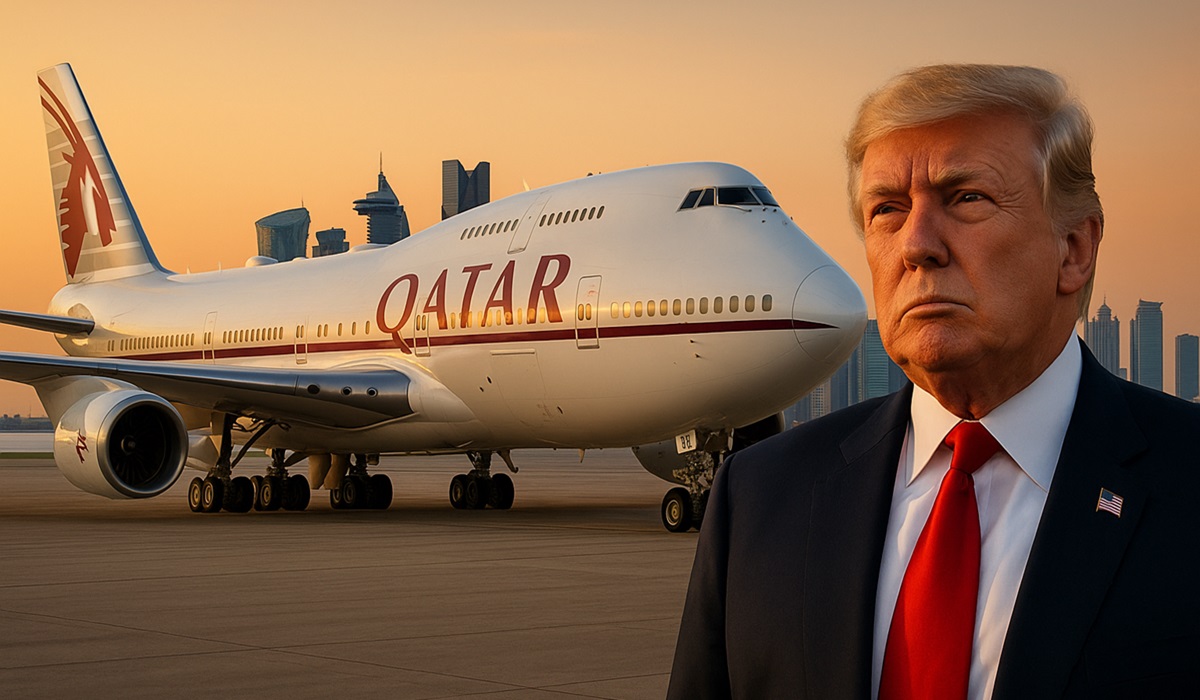The Qatar Trojan Horse Fallacy: When Political Paranoia Replaces Common Sense
- TDS News
- Middle East
- Trending News
- May 20, 2025

By: Donovan Martin, Editor in Chief
In the world of high diplomacy and global statecraft, political gifts are a storied tradition. Whether symbolic tokens, cultural artifacts, or opulent gestures, the exchange of gifts among world leaders is an ancient practice that continues to stir intrigue—and, increasingly, controversy. Today, no gift has drawn more attention or divided more opinions than the reported $400 million luxury jet presented by the Qatari government to U.S. President Donald Trump. While critics raise alarms about optics, ethics, and the U.S. Constitution’s emoluments clause, others argue this is simply the business of geopolitics done at the highest level—lavish, strategic, and rarely straightforward.
The aircraft in question is no ordinary plane. It’s a custom-outfitted wide-body aircraft, the kind often reserved for heads of state and global royalty. Equipped with a full stateroom, conference room, secure communication suites, luxury lounges, gold-trim interiors, and enough range to fly from Washington to Doha nonstop, the estimated $400 million gift is emblematic of the kind of wealth and hospitality long associated with the Gulf states. In Qatar’s political culture—where generosity is synonymous with respect and strategic kinship—such a gift is not out of place. Yet, in America’s increasingly polarized climate, the line between generosity and impropriety is hotly contested.
Let’s be honest: extravagant gifts have always found their way into the corridors of power. From ornate daggers given to European monarchs to the famed Statue of Liberty gifted by France to the United States—a present which today holds priceless historical and symbolic value—the exchange of gifts is foundational in diplomacy. And while times and standards have evolved, the art of giving remains deeply embedded in international relations. Often, the size or scale of the gift reflects the depth of the relationship or the gravity of a political alliance.
But here’s where perspective matters. The United States has deep-rooted and multifaceted ties with Qatar. As host to one of the largest U.S. air bases in the Middle East—Al Udeid Air Base—Qatar is a linchpin in America’s security architecture in the region. It is also a key player in U.S. energy markets and a critical voice in diplomatic backchannels, often mediating delicate regional disputes. When President Trump visited the region, his administration reportedly helped ink military and business deals worth hundreds of billions of dollars. Within that broader framework, the plane becomes more than just a shiny object—it becomes a symbol of alignment, mutual respect, and strategic cooperation.
Yet predictably, some voices have pushed the conversation into the realm of the absurd. One of the more insulting narratives circulating is that this aircraft might be a Trojan horse—a gift disguised as a threat, supposedly laced with surveillance devices or sabotage technology. This kind of fear-mongering doesn’t just stretch credibility—it obliterates it. The United States possesses the most sophisticated security and defense protocols in the world. A plane like this would be disassembled, inspected, scanned, and analyzed to the last microchip by multiple federal agencies before even being allowed near the President. The idea that it would just be accepted, boarded, and flown without scrutiny is ridiculous on its face.
And let’s apply some geopolitical common sense. Would Qatar—a nation that hosts American military assets, partners on counterterrorism, and has billions of dollars invested in U.S. infrastructure—really risk open conflict with the United States by attempting to harm its President with a tricked-out plane? That’s not just implausible. It’s ludicrous. The Qatari Royal Family, whose wealth is matched only by its reputation for diplomacy, would have zero interest in launching a suicide mission disguised as a state gift. To even suggest that is to insult both nations, and to ignore the entire logic of modern diplomacy.
In truth, what this argument reveals is just how far political discourse has fallen. This isn’t about national security. It’s about narrative warfare. The moment Trump’s name is attached to anything, reason flies out the window and fantasy floods in. This is not a defense of Trump or of the extravagant nature of the gift—it’s a call for rational thought. Conspiracy theories about sabotage jets are not critical analyses; they’re the fever dreams of people who have traded common sense for partisan obsession.
Let’s not forget: if this plane had been offered to any Democrat, the response behind closed doors would likely be the same—gratitude and interest. The only difference would be the careful coordination of optics. Everyone loves the idea of luxury, just not when the other side is receiving it. To pretend otherwise is disingenuous.
This is where the media excels in narrative-making. For Trump’s critics, the plane is a scandal waiting to be unraveled. For supporters, it’s another example of his bold and unconventional leadership, one that breaks with old rules to secure new deals. And for the average observer, the question may simply be: does this gift change anything? Will it sway decisions or alter foreign policy? Or is it simply a ceremonial acknowledgment between two global actors who understand the game of power?
We should also acknowledge a harder truth: extravagant diplomacy is not new, nor is it exclusive to the Trump administration. Leaders throughout history have accepted—and offered—gifts that far exceed the average citizen’s imagination. While America is governed by a constitutional framework that demands accountability, it must also navigate a world where not all actors play by the same rulebook. Declining a gift from a Middle Eastern monarchy could be perceived as an insult, a signal of disrespect, or even a diplomatic rift. Accepting it, on the other hand, becomes fodder for domestic criticism.
And yes, the emoluments clause exists for a reason. Its intent—to prevent personal enrichment via foreign influence—is vital. But let’s also acknowledge the reality that the clause was written in a very different time, for very different circumstances. The lines between state gift, diplomatic gesture, and personal benefit are not always black and white. Until courts or Congress rule otherwise, this jet is just that: a jet. A gift. An expensive one, yes—but also a gesture rooted in strategic alignment.
Ultimately, every world leader is charged with putting their nation first. If accepting a gift helps secure military cooperation, opens new trade routes, or strengthens alliances that benefit millions, then perhaps it is time we view such gestures through a lens of strategic realism rather than moral absolutism. In a world driven by influence and leverage, even a $400 million plane might just be the cost of doing business.
What’s dangerous isn’t the plane—it’s the growing inability to separate facts from fantasy. If American political culture continues to treat every foreign gesture as a potential threat simply because of who’s in office, it won’t just weaken diplomacy—it will cripple it. And that’s a price no nation can afford.








